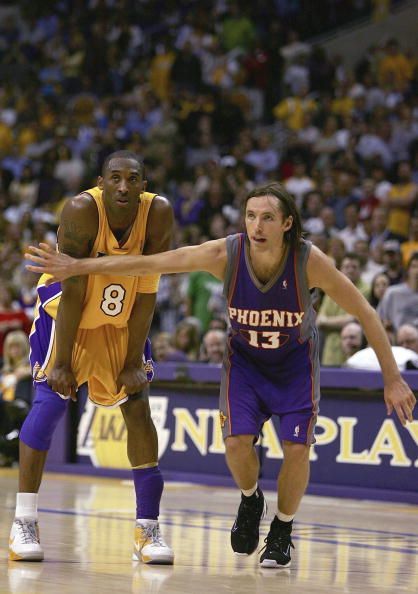by John Walters

People are complicated. Kobe Bryant was complicated. I’m complicated. You’re complicated.
Kobe had become a gracious and open ambassador of hoops and fatherhood and Laker-dom in his final years. Of course it is a tragedy that he and the eight others, including three young teenage girls, all perished last Sunday.
But last night I remembered something that Steve Nash had said on TNT earlier this week and that in turn jogged another memory. First, let’s listen to Nash’s thoughts on Kobe and pay particular attention to what Nash says about their 2006 playoff series, Suns-Lakers (you can begin at about the 2:40 mark):
What Nash says about Bryant and the aftermath of that 2006 series is as insightful as anything I’ve read or heard about him in the past week. Let’s go back to that first-round playoff series, one in which the :07-Or-Less Suns would fall behind three games to one, then win the final three games to advance.
In the first four games Kobe was sharp but not dominant. He scored a game-high 29 points in a Game 1 loss, then 29, 17 and 24 in three consecutive Laker victories. In those three contests he either tied for or was one point behind the Lakers’ leading scorer. But he was still Kobe: when it mattered most he delivered, as in this gut-wrenching (for Suns fans) defeat in Game 4 at Staples, as Kobe not once but twice scored game-tying/winning baskets in the final seconds, first of regulation and then of overtime.
This was a classic (above).
Then a funny thing happened. The Suns didn’t set. Game 5 in Phoenix was the first lopsided result of the series (the previous four games had each been within 7 or fewer points), 114-97, a Phoenix win. Kobe scored a game-high 29 points.
Game 6 in Los Angeles was supposed to be Phoenix’s final stand. Kobe would score a series-high 50 points. But the Suns won, at Staples, 126-118.
Then a funnier thing happened. A narrative began that said that Kobe needed to distribute the ball more. See, in the three games the Lakers had lost Kobe had been the game’s high scorer. In the three games Los Angeles had won, he hadn’t been. Math!
So that became the popular narrative in print and on television (thank God Twitter and most ESPN morning gabfests had not yet been created). Kobe needs to be more unselfish.

Flash to Game 7. After one quarter in Phoenix, the Suns lead 32-15. Los Angeles is able to recover somewhat in the 2nd quarter, outscoring the Suns by 2. But they still trail by 15, 60-45, at intermission. At this point Kobe has 23 of the Lakers’ 45 total, or more than 50%.
It’s hazy, but I seem to recall Laker coach Phil Jackson being interviewed before he entered the tunnel. I think Phil may have said something to the interviewer, or simply just insinuated, that Kobe would need to distribute the ball more. To get his teammates more involved. And I definitely don’t know what Phil said in the locker room.
But here’s what I do know, because I was watching and I was paying attention. So read this carefully: In the second half Kobe Bryant, the greatest one-on-one basketball player since Michael Jordan, never once on offense took himself inside the three-point arc. Not once.
I couldn’t believe it as it was happening. Kobe seemed to be saying, “You want a distributor? A facilitator? I’ll give you one.” And so he stood out on the arc, making perfunctory passes to teammates and occasionally tossing up a shot. But everything in his body language was saying, “Here, guys, you four get the job done.”
Kobe went AWOL. In the second half of this Game 7 the greatest scorer since MJ jacked up just three shots and scored one point. One.
Kobe was willing to throw away a Game 7 (granted, his team trailed by 15 on the road) to prove a point. Out of spite. This wasn’t valiant. It was petulant. Phoenix would outscore Los Angeles by 16 points in the second half to win 121-90 and overcome a 3-1 deficit to win the series. It was a euphoric night for Suns fans but also a strange one: the greatest player of his generation had spent the second half of a Game 7 pulling a Melania Trump: I don’t care, do you?
They’ll air the 81-point game, and they should. But I’d like to see the second half of this Game 7 again. Maybe Kobe absent-mindedly stepped a foot or two inside the three-point circle once or twice in the second half. I’m not 100% sure. I do know he was not on the attack. My memory is that he scored 2 or zero second-half points to finish with 16.
Kobe would grow from this evening. But on this night, in a Game 7 in Phoenix, Kobe did something that MJ never would have done. He gave up. Because he was angry, I guess, at being scolded for simply being too good. And he didn’t appreciate that this team, this coach, did not appreciate him. In many ways, he was correct. But his rebellion, and it’s timing, was far from his finest hour.